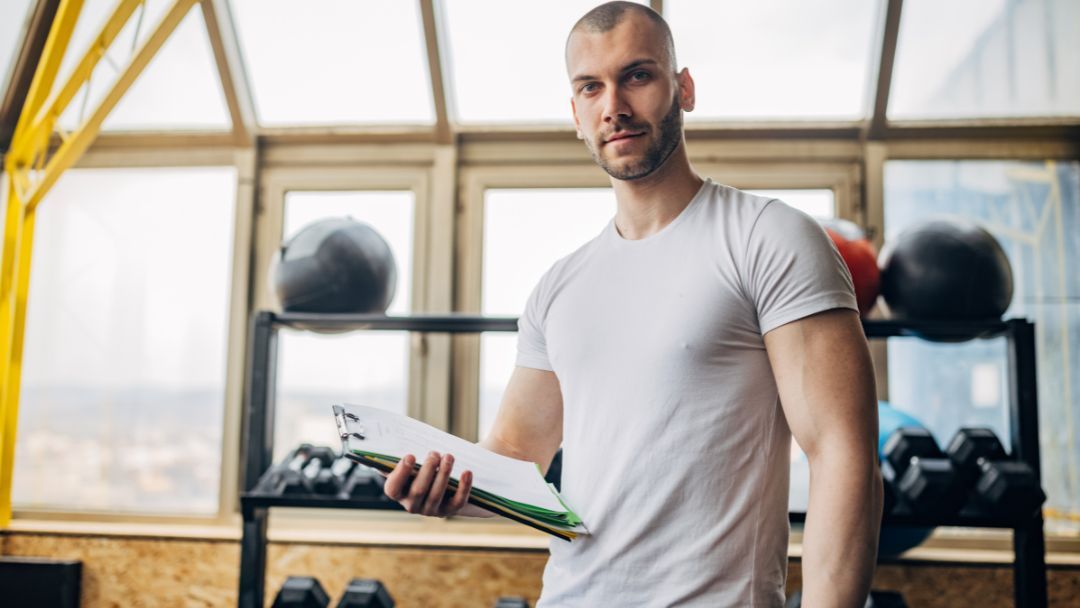Education Needed To Become A Personal Trainer in 2024

By Pritesh Baviskar
Posted Tue, Jan 2, 2024 | 9 min read
Table of contents
- The Foundation: High School Education
- Post-secondary Education For Fitness Trainers
- Personal Trainer Certification: Your Ticket to the Industry
- Specialized Certifications
- Life-Saving Skills: CPR and AED Certification
- Continuing Education As A Personal Trainer
- Practical Experience: A Must-Have to Become a Personal Trainer
- Soft Skills: The Unspoken Essentials
- Legal and Insurance Considerations
- Conclusion

Are you considering a career as a personal trainer? This field is not only about guiding others to achieve their fitness goals but also about having the right education and certifications.
In this guide, we will navigate through the vital steps of obtaining the education and certification needed to become a successful personal trainer.
From obtaining your high school diploma to choosing the right personal trainer certification, we cover it all.
Whether you're looking to work in a gym or start your own fitness training business, this guide will provide you with the insights needed to embark on your journey in the health and fitness industry.
The Foundation: High School Education
A high school diploma or GED marks the beginning of your educational journey to becoming a personal trainer. This phase is more than just meeting a formal requirement; it's about building a solid foundation in key areas.
- A high school education introduces you to basic concepts in biology and physical education, providing a sneak peek into exercise science.
- Developing skills in mathematics and communication is essential for future tasks like creating fitness plans and communicating effectively with clients.
- This stage is vital for setting the groundwork for further education and certifications in personal training.
In essence, your high school years are not just about obtaining a diploma; they are about preparing yourself for the comprehensive world of personal training.
Post-secondary Education For Fitness Trainers
After obtaining your high school diploma, the next step in your journey to becoming a personal trainer is considering post-secondary education. Pursuing a degree in a related field can significantly enhance your understanding and skills.

- Degrees in exercise science, kinesiology, or physical education deepen your knowledge about the human body, fitness techniques, and health.
- These programs often cover crucial aspects of nutrition, anatomy, physiology, and exercise program design, all of which are important for effective personal training.
- The knowledge gained through these degrees empowers you to provide more informed and scientifically backed training advice to your clients.
A degree in a relevant field, while not mandatory for all personal training certifications, sets you apart in the competitive fitness industry and prepares you for a more advanced role in personal training.
Personal Trainer Certification: Your Ticket to the Industry
Once you've laid the educational groundwork, obtaining a certification becomes your gateway to becoming a professional personal trainer. This step is vital in establishing credibility and expertise in the field.

- Selecting the right certification program is key. Reputable organizations like the American Council on Exercise (ACE), National Academy of Sports Medicine (NASM), or International Sports Sciences Association (ISSA) offer well-recognized certification programs.
- Preparing for and passing the certification exam requires dedication and a thorough understanding of exercise science, training methodologies, and client assessment.
- Many certification programs also require CPR and AED (Automated External Defibrillator) certifications, ensuring that you are prepared to handle emergencies during training sessions.
Successfully obtaining your personal trainer certification not only validates your knowledge and skills but also opens up numerous opportunities in the fitness industry, from working in gyms to starting your own personal training business.
Specialized Certifications
After achieving your initial certification, consider specializing to distinguish yourself in the fitness industry. Specialized certifications allow you to expand your expertise and cater to a wider range of clients.
- Options include certifications in areas like strength training, yoga, Pilates, or nutrition. Each of these focuses on a unique aspect of fitness and wellness.
- Specialized certifications often involve in-depth study of specific techniques and principles, enabling you to tailor exercise programs more effectively for individual client needs.
- Pursuing these additional certifications demonstrates your commitment to continuous learning and professional growth in the field of personal training.
By adding specialized credentials to your portfolio, you not only increase your marketability as a fitness trainer but also enhance the quality of service you can offer to your clients, helping them to achieve their fitness goals in more specific and effective ways.
Life-Saving Skills: CPR and AED Certification
In addition to fitness-related knowledge, personal trainers must be equipped with essential life-saving skills. CPR (Cardiopulmonary Resuscitation) and AED (Automated External Defibrillator) certifications are often required for personal trainers.
- These certifications ensure that you are prepared to respond effectively in emergency situations that may occur during training sessions.
- Learning CPR and how to use an AED can make a critical difference in ensuring client safety and wellbeing.
- Most personal training certification programs mandate these certifications, reflecting the industry's emphasis on safety and emergency preparedness.
By acquiring these certifications, you not only fulfill a key requirement for personal training but also demonstrate your commitment to the overall health and safety of your clients.
Continuing Education As A Personal Trainer
Staying relevant and effective as a personal trainer requires a commitment to ongoing learning. The fitness industry is dynamic, with new research and trends constantly emerging.
- Regular participation in workshops and seminars keeps your skills and knowledge up to date.
- Many certifying bodies require a certain number of continuing education credits to maintain your certification.
- Advanced certifications or even a master's degree in specialized areas can significantly enhance your career prospects and expertise.
Continuing education not only ensures that your certification remains valid, but it also enables you to offer the most current and effective training methods to your clients, helping them to meet their fitness goals in the best way possible.
Practical Experience: A Must-Have to Become a Personal Trainer

Securing practical experience is a key step in your journey to become a personal trainer. This experience is where the theoretical knowledge from your certifications and education is applied in real-world scenarios.
- Hands-on experience through internships or assistant roles at gyms provides invaluable insights into the day-to-day responsibilities of personal trainers.
- Working with a diverse range of clients early in your career helps you understand varying fitness goals and needs, enhancing your ability to tailor training programs effectively.
- Building a professional network within the fitness industry can lead to mentorship opportunities and insights into evolving training techniques and business practices.
This phase of your journey is important in shaping your skills and confidence, preparing you for a successful and dynamic career in personal training.
Soft Skills: The Unspoken Essentials
The journey to becoming a successful personal trainer involves more than just gaining technical expertise. Soft skills are vital elements that significantly impact your ability to connect with clients and manage your professional career effectively. Here's a closer look at these essential skills:

- The foundation of a personal trainer's success lies in effective communication. Being able to listen to and understand your clients' needs, goals, and concerns is imperative. Empathy goes hand in hand with this, as it helps in building trust and a deeper connection with clients, making them feel valued and understood.
- Each client is unique, and so are their fitness journeys. The ability to adapt your training style to suit different personalities, fitness levels, and preferences is key to keeping clients engaged and motivated. This flexibility also helps in handling unexpected situations during training sessions.
- Clients come with various challenges, be it physical limitations, lack of motivation, or specific fitness goals. A good personal trainer needs to think on their feet and devise effective, customized solutions that cater to these individual challenges.
- Personal trainers often work with multiple clients, each with different schedules. Efficiently managing your time and staying organized is essential to ensure that each client receives the attention they deserve, and your business runs smoothly.
- If you're looking to establish your own fitness business or advance within an organization, understanding the basics of business management, marketing, and client retention is essential. This skill set helps you in effectively promoting your services, managing finances, and growing your client base.
Incorporating these soft skills into your professional repertoire is just as important as your physical training skills. They enhance your ability to effectively guide clients through their fitness journeys and contribute significantly to your success as a personal trainer.
Legal and Insurance Considerations
Understanding legal and insurance matters is not just about compliance; it's about protecting yourself and your clients. Here are some key considerations:
- This is essential for personal trainers. It protects you in case of injuries or accidents during training sessions. Having liability insurance demonstrates professionalism and a commitment to client safety.
- Whether you're an employee at a gym or running your own business, clear contractual agreements with your clients are vital. These should outline the scope of your services, payment terms, and liability waivers.
- Ensure that your certifications are from accredited organizations like NASM or ACE. This not only enhances your credibility but also ensures adherence to industry standards.
- Beyond CPR and AED certifications, being trained in first aid and having a sound knowledge of emergency procedures is crucial. This ensures you are well-prepared to handle any medical emergencies that may arise during training sessions.
- The health and fitness industry can be subject to changes in legal regulations. Keeping yourself informed about these changes helps in maintaining compliance and offering the best service to your clients.
Understanding these legal and insurance aspects is key to building a sustainable and reputable personal training career. It not only protects you legally and financially but also instills confidence in your clients, knowing they are in safe and professional hands.
Conclusion
Embarking on a personal training career is an enriching journey, blending passion for fitness with the pursuit of knowledge and skill. This guide has highlighted the essential steps, from foundational education to the nuances of legal and insurance aspects.
- Education and certifications form the bedrock of your expertise in personal training.
- Real-world experience, garnered through internships and client interactions, hones your practical skills.
- Soft skills such as communication, adaptability, and business knowledge are key to client relationships and career success.
- Knowledge of legal and insurance issues safeguards your practice and ensures client well-being.
Remember, each step in this journey not only enriches your professional abilities but also contributes to your growth as a holistic fitness expert. Stay dedicated to learning and evolving, and your career in personal training will be as fulfilling as it is dynamic.

I'm one of the founders at CoachGenius. As someone with a genuine understanding of the online coaching landscape, I'm no stranger to the challenges faced by personal trainers. I like to write about goal setting techniques, building personal brand and creating engaging online content related to fitness.
